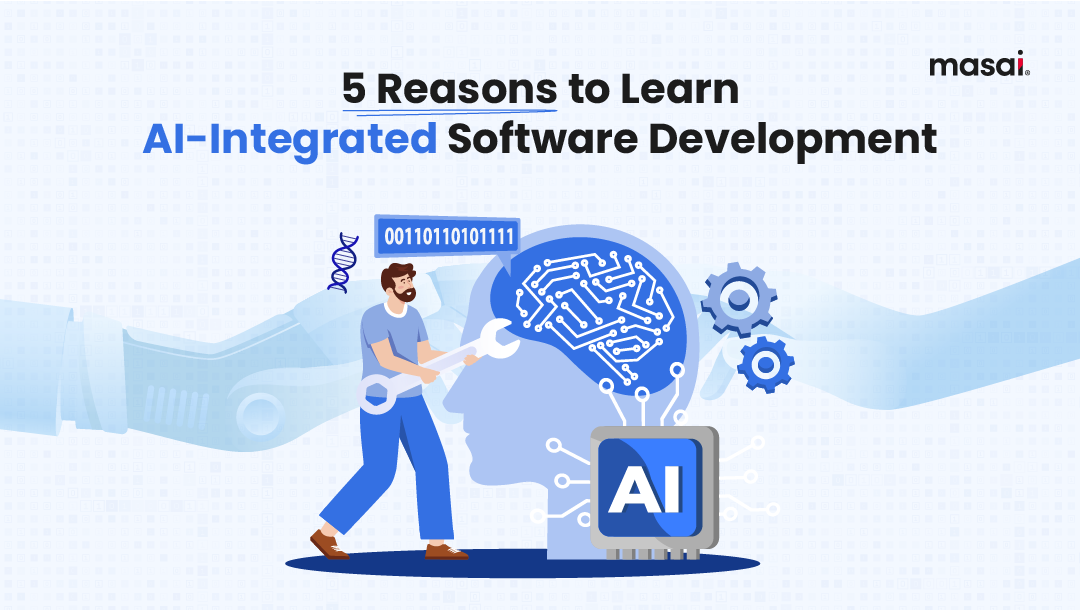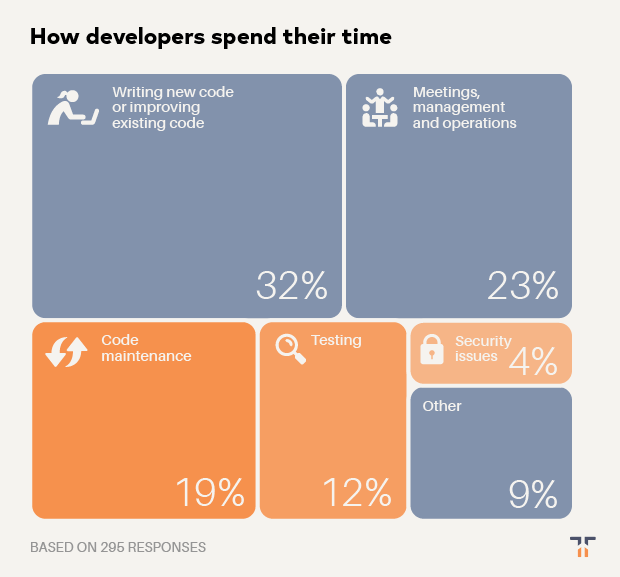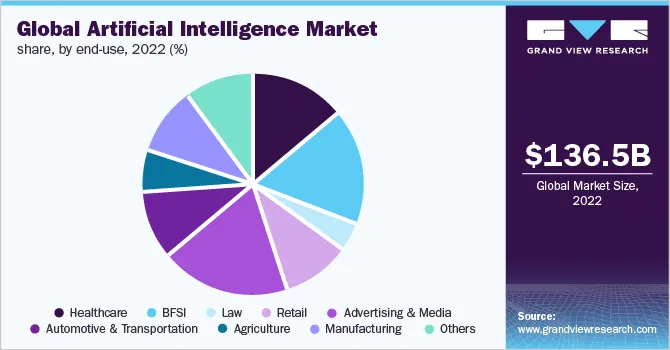5 Reasons Why Developers Should Learn AI-Integrated Coding
Gaining expertise in AI-integrated coding ensures your skills remain relevant and demanded in the job market for the foreseeable future. It’s not just a 'nice-to-have'– it's becoming a necessity.

For decades, artificial intelligence (AI) was the focus of people's imaginations and the main plot of science fiction movies. Now, whether people realise it or not, AI is prevalent in people's daily lives. And with the rise of generative AI tools such as ChatGPT, Midjourney, BARD, and many others, AI adoption has skyrocketed in the industry.
In fact, the global enterprise adoption of AI is estimated to grow at a compound annual growth rate of 38.1% between 2022-2030.
And this adoption ensues across the board whether it be in marketing, sales, operations, or software development. Especially, development.
The integration of AI into programming is transforming the way we develop software and approach problem-solving.
So, if you’re an aspiring developer, sooner or later you’ll come across generative AI, you’ll be asked to work with it at most companies, and furthermore, you might also need to develop AI tools on your own.
Should you ride this new wave or stick to traditional coding methodologies?
If you're standing at this crossroads, this article is a must-read for you. It explores the 5 compelling reasons why learning AI-integrated coding is no longer optional but a necessity for future developers.
Buckle up, as this journey might just change your career trajectory!
Future-Proof Your Career
Following Dropbox's decision to let off 500 employees as it focuses on AI, IBM also plans to replace 7,800 jobs with AI technology and halt hiring for roles that could be automated.
With AI revolutionizing every industry including finance, healthcare, high tech, and Edtech among others, the companies are more likely to cut costs on conventional developers and streamline hiring to fit developers who can leverage AI, and produce greater and faster output.
While the advent of artificial intelligence is expected to result in a displacement of 85 million traditional jobs, it's crucial to view this as a transformative phase rather than a termination. As the same report predicts the creation of 97 million new jobs as well.
And in this booming arena of AI, gaining expertise in AI-integrated software development ensures your skills remain relevant and in demand in the job market for the foreseeable future. It’s not just a 'nice-to-have'– it's becoming a necessity. It's about working smarter, not harder. As automation continues to shape the future of work, the line between coding and AI will keep blurring.
The Chinese saying, "The wise adapt themselves to circumstances, as water molds itself to the pitcher” really holds true for career and life.

Whether you're a student considering a career in software development, or an established developer looking to upskill, there's never been a better time to dive into AI-integrated coding.
Enhanced Productivity
Imagine you're writing code, and an AI tool predicts what you want to type next, or better yet, it identifies a bug in your code and suggests the most suitable fix. Sounds magical, right?
According to a joint survey by Tidelift and The New Stack, developers only spend 32% of their time doing what they love the most- writing new code or improving existing code. The rest of the time goes into meetings, testing, maintenance, and other security issues.

This is where AI-integrated coding tools can fit in and provide intelligent suggestions, automate repetitive tasks, and optimize code, thereby allowing developers to focus more on the complex logic and creative part of coding.
By integrating AI into their workflows, developers could recover much of the 68% of the day currently spent on other tasks and be more productive and pivotal.
Demand in Diverse Industries
AI skills are highly transferable across various sectors due to the pervasive nature of technology and data. As a result, developers proficient in AI-integrated coding have the potential to explore a vast array of industries.
It allows developers to build applications that can make robust decisions based on data analysis. For instance, AI can be used to develop recommendation systems for e-commerce websites that analyze user data and suggest products they might like. Netflix's recommendation engine is a great example of this, as it uses AI to analyze viewer preferences and suggests shows they might enjoy, leading to increased user engagement and retention.

And not just OTTs and E-commerce, other industries are also leveraging similar AI systems, such as finance for predictive analysis, healthcare for personalized treatments, and logistics for optimizing delivery routes.
Developers with these skills can not be confined to a specific field, thus opening doors to diverse career opportunities.
Leadership Opportunities
Yes, it’s true. AI-integrated coding skills are not just about technical proficiency; they also encompass strategic thinking, project management, and leadership abilities that are essential in the modern tech industry.
Here’s how:
- Understanding AI's Impact: Developers proficient in AI aren't just coders; they are strategists who understand how AI can reshape businesses and industries. They can anticipate its potential impact on various business aspects, which is a skill highly appreciated in leadership roles.
- Project Management: AI development projects often involve cross-functional teams, including data scientists, data engineers, business analysts, and other stakeholders. AI-skilled developers are often placed in a position where they have to manage these diverse teams, ensuring smooth communication, coordinating tasks, and handling potential conflicts. This is a crucial leadership skill that goes beyond pure technical abilities.
- Advising on AI Ethics: As it becomes more prevalent, ethical considerations surrounding its use are becoming increasingly important. Developers equipped with AI skills have the ability to advise on these issues, guiding the company in creating applications that are not only technologically advanced but also ethically sound.
Drive Innovation and Create Impact
The advent of AI-integrated coding has unlocked new horizons in problem-solving and innovation. It allows developers to move beyond traditional coding boundaries, fostering creativity and empowering them to build solutions that were once thought impossible.
Take healthcare, for example. By integrating AI with coding, developers can create advanced healthcare applications, such as predictive models for disease diagnosis or AI-powered prosthetic devices that can mimic natural movements.
AI amplifies programmers’ ability to create ground-breaking applications that significantly impact individual lives and society at large. As we stand on the brink of the AI revolution, such skills are not just a valuable asset but a critical instrument in shaping a better future.
Wrap Up
It's time to stop viewing AI as a challenge and start recognizing it as an opportunity—an opportunity to future-proof your career, make your mark in diverse industries, and step up as a leader in the tech world.
As a developer, you need a proactive approach to learning and adapting. By mastering AI-integrated development, you position yourself at the forefront of technological advancement, ensuring a thriving and successful career in the ever-evolving tech industry.
Cheers!
More resources for you:
Harnessing the Power of Generative AI: Redefining Education at Masai
Unleashing the Future: How AI is Transforming Software Development
The Art of Debugging: Mastering the Bug Hunt, One Error at a Time
Dynamic Programming 101 | Types, Examples, and Use-Cases
How Software is Developed? A Step-By-Step Guide

